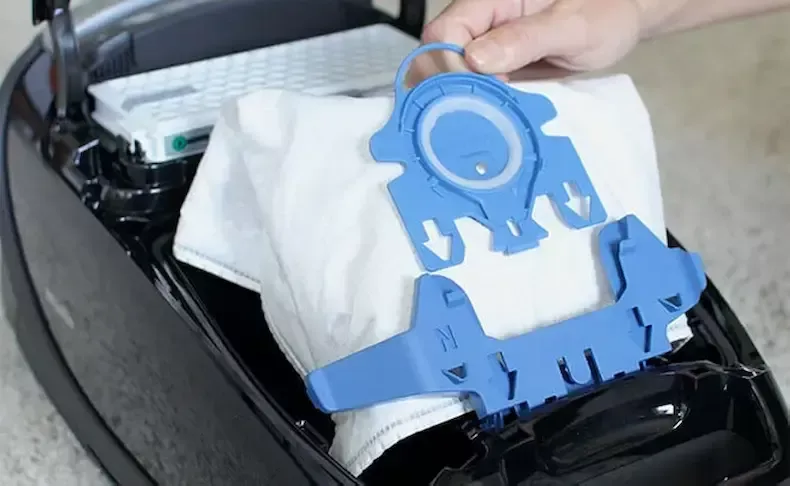For those who suffer from them, allergies, asthma, and COPD are no joke. While the right vacuum can bring significant relief, the wrong vacuum can unleash additional allergens into your indoor air, triggering worse symptoms. Selecting the right product for the job is the number one priority. A vacuum that provides HEPA filtration in sealed system construction, and uses multi-layered/hygienic bags isn’t just a purchase, it’s an investment in your health.
Most traditional vacuums lack the ability to capture the tiny particles that trigger allergic reactions. Air not only passes through these vacuums, but through the accumulated dust and debris before flowing back into your air. Allergens also escape through leaks in the vacuum cleaner’s housing. Is there any relief to be had?
Happily, today’s modern HEPA vacuum cleaners offer choices for finding the best allergy vacuum cleaner for your home. For easy access to the sections of this article, use the links below:
- Exploring HEPA Vacuum Filters
- AAFA Certification
- Should I Use Bags or Go Bagless?
- Recommendations
- Start Improving Your Air Today
Exploring HEPA Vacuum Filters
High Efficiency Particulate Arrestance (Air) or HEPA vacuum filters work by forcing air through specially designed and constructed media that is tightly woven and arranged to capture and retain 99.97% of particles like dust, pollen, and pet dander down to 0.3 microns. To put it in perspective, 0.3 microns is almost 300 times smaller than the diameter of a human hair.
Why is HEPA Filtration Important?
When you vacuum, air flows in through the powerhead depositing debris and dust into the collection bin or dust bag. It then continues to flow out of the vacuum through the exhaust vent usually located in the back or underneath the vacuum.
Without superior filtration, fine dust and allergens such as pollen, bacteria, and dander flow right out with it and back into your indoor air. Vacuums without HEPA filtration can allow debris as large as 50 microns to escape back into your home’s air.

HEPA vacuum filters provide the same level of filtration used in many air purifiers, so the exhausted air from the vacuum is actually cleaner than what went inside. When combined with a sealed system, HEPA filtration is the best investment you can make to help eliminate allergens when vacuuming. Not only will surfaces and floors be dust free, but your air will be clean as well.
What is a Sealed System?
For some people, a HEPA filter-equipped vacuum alone isn't enough. Severe symptoms require going a step beyond HEPA filtration. A vacuum with a sealed system has an airtight, or sealed, housing. Without a sealed system, dust and allergens can often leak back into your environment through the seams or cracks in the vacuum's housing.
Vacuums with a sealed filtration system have been tested during use to verify that virtually no air is escaping from the vacuum except the air forced through the HEPA filter. Not all vacuums that feature HEPA filtration have sealed systems so it’s best to check for this important feature.
What is S-Class Microfiltration?
Not often seen in America, S-Class filtration can also be referred to as “hospital-grade” filtration and actually exceeds HEPA standards. These filters are made from electrostatically charged micro- fiber material that not only captures, but even attracts fine dust and other particulates down to 0.3 microns with 99.9% efficiency. Some European-made vacuums, like SEBO, have vacuum filters in this class.
AAFA Certification
If you or a family member suffers from severe allergies, you probably are aware that AAFA is the Asthma and Allergy Foundation of America. This non-profit organization was founded in 1953 and is a trusted provider of educational programs, research, advocacy, and support for allergy sufferers.
Its certification program investigates and tests products against strict standards to assist consumers in determining which products are best suited for people with asthma and allergies. An AAFA Certified vacuum cleaner, like Dyson, meets performance tests that ensure it reduces the total allergen burden, while minimizing any increase in airborne allergen levels.
This does not mean that HEPA vacuums which are not specifically AAFA certified do not have true HEPA filtration. Many do, but have not applied for this certification.
Should I Use Bags or Go Bagless?
This is one of the most often asked questions when considering an allergy friendly vacuum. Generally, bagged HEPA vacuums offer an added level of protection for those who are really concerned about indoor air quality. Not only do they use a HEPA filter for exhausted air, but also provide filter dust bags constructed of multiple layers of filter media to effectively contain what the vacuum collects.
In addition, these feature an auto-seal closure when the bag is removed for changing, or come with hygienic caps to seal the bag before removing so you can be sure nothing escapes into the air.

Some of the newer bagless models now offer dust bins that actually eject debris into a waste container rather than just allowing it to fall out. This is accomplished by pressing a release button on the bin and it reduces the amount of fine dust and allergens that can float back into the air.
However they aren’t as effective at containing allergens as a bagged HEPA vacuum. If you’re really concerned about any dust escaping but don’t want to have to continually purchase bags, you can eject the bin contents into a bag or trash can outside your home. Be sure to wash and dry the bin thoroughly before replacing and vacuuming.
Recommendations
For vacuums that provide HEPA filtration with the power to capture fine dust and allergens, there are several manufacturers which offer high-quality machines with excellent warranties.
- Miele vacuums not only have HEPA filters, but filter dust bags and pre-filters as well, most in sealed systems. They also come in upright and canister models with a wide variety of tools.
- Dyson vacuums, well-known for powerful suction, are of the bagless variety and are AAFA Certified. They feature unique cyclonic technology to trap the tiniest particulates and also offer many tools and accessories for specialized cleaning.
- SEBO Vacuums are German-engineered, tested during use in non-laboratory settings for air leakage, and are among the highest rated with a sealed system. They provide S-Class, hospital grade filtration, including filter bags and pre-filter.
- NaceCare is another, lesser-known high-quality vacuum with S-Class filtration in a sealed system. Better known in Europe as "Henry" and made in Germany, NaceCare vacuums have one of the best warranties in the industry and provide a choice of cleaning kits to fit your home.
You can quickly view all of our HEPA vacuums, including those with a sealed system, and compare models to help you make the best choice for your home and family.
In Summary
Improving your indoor air quality doesn’t have to be a time intensive task. Consider your environment, your preferences regarding vacuum types, and select the best HEPA vacuum for your unique circumstances. If necessary, look for a sealed system and be sure your choice has all the tools you’ll need for keeping your home allergy free.
In addition to cleaning with a HEPA vacuum, for severe symptoms from asthma or COPD, consider adding an Air Purifier to your home’s arsenal of allergen-fighting weapons.
Questions?
Check out our Vacuum Cleaner Knowledge Center for additional articles on allergies and vacuum cleaners. Not sure what's best for you? We can take the guess work out of decision-making. Contact our product experts toll free at 1-800-934-9194 for a detailed consultation. Our goal is to make your indoor environment healthy and comfortable.


